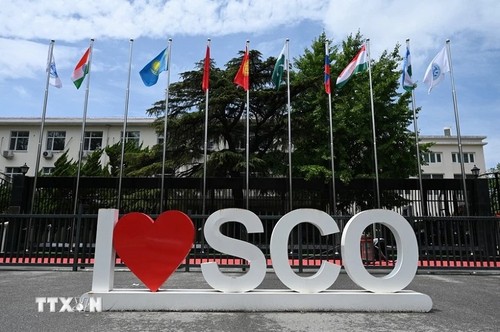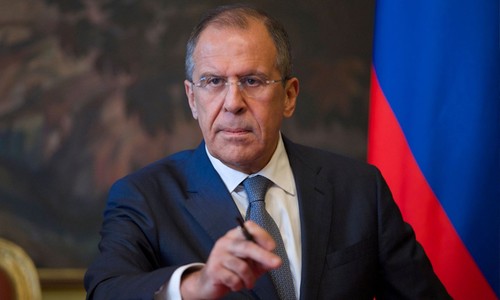 The flags of Shanghai Cooperation Organization (SCO) member countries at the SCO headquarters in Beijing, China (Photo: VNA) The flags of Shanghai Cooperation Organization (SCO) member countries at the SCO headquarters in Beijing, China (Photo: VNA) |
Established in 2001 in Shanghai, China, the SCO now has nine members: China, Russia, Kazakhstan, Kyrgyzstan, Tajikistan, Uzbekistan, Pakistan, India, and Iran. The SCO extends over 60% of Eurasia and includes 50% of the world’s population and 32% of global GDP.
Enhanced connectivity
As this year’s SCO rotating chair, Kazakhstan has organized 180 events to strengthen security and stability in member countries and promote long-term trade, investment, transportation, and energy strategies. Based on the wealth of natural resources, minerals, and energy possessed by SCO countries, Kazakhstan has set energy cooperation as a top priority for discussion at this year's Summit.
At an SCO Energy Ministers’ Meeting on June 26th in Astana, the Kazakh government announced a "Strategy for the Development of Energy Cooperation until 2030" which will be signed and ratified at this Summit.
Kazakhstan’s Energy Minister Almasadam Satkaliyev said the strategy is the result of 16 meetings over the last year. When implemented, it will help SCO countries ensure energy security and reap huge economic benefits in the long term.
“The document points out some basic orientations and strategies to ensure energy security, including large-scale investment projects such as power generation, renewable energy, development of a national power grid, cross-border power transmission lines, energy storage systems, and other energy sources, including hydrocarbons,” said Satkaliyev.
Infrastructure and connectivity of road, railways, ports, and transportation technology are other priorities of this year's SCO Summit. The highlight is the Central Corridor Project, also known as the Trans-Caspian International Transport Route (TITR), which starts in China, runs through Kazakhstan, the Caspian Sea, and Azerbaijan, and ends in the South Caucasus region.
China, Uzbekistan, and Kyrgyzstan recently signed an agreement to build a cross-border railway corridor as part of the Belt and Road Initiative to facilitate intra-bloc trade.
In the context of growing challenges from climate change and technological advancement, particularly artificial intelligence, SCO countries have enhanced cooperative management of water resources, expanded digital economic connections, and synchronized e-commerce and e-customs. The SCO has been accelerating a plan to build its own financial structure, including payment mechanisms and the use of national currencies in SCO trade transactions.
 Russian Foreign Minister Sergei Lavrov (Photo: AFP) Russian Foreign Minister Sergei Lavrov (Photo: AFP) |
Security role
Its initial purpose was just to heighten cultural dialogue and enhance economic cooperation in Central Asia, but the growth of its founding members and the admission of new members has expanded the SCO’s influence. It is now one of the world’s most important organizations in economics and energy – particularly oil, gas, and uranium – and enjoys a new stature in global security and geopolitics.
After admitting Iran last year, the SCO plans to admit Belarus as its 10th member at this year's Summit, thereby expanding its influence to Eastern Europe. Russian Foreign Minister Sergei Lavrov said on June 25: “The first activity at the SCO Summit in Astana will be the formal admission of Belarus as a full member and Belarus will participate in the Summit on an equal footing with other members.”
Maxim Kramarenko, head of the Information and Analysis Center of Kazakhstan’s Eurasian Policy Institute, said this year's SCO Summit could be the beginning of a new collective security structure in the Eurasian region with a new center to counter challenges and threats.
The new center is built on the foundation of the SCO Regional Anti-Terrorism Structure (RATS) and other dialogue mechanisms, the Collective Security Treaty Organization (CSTO), the Conference on Interaction and Confidence Building Measures in Asia (CICA), and a security dialogue initiated by Kazakhstan’s President Kassym-Jomart Tokayev in 2022.
The goal of this new center is to defend the sovereignty of SCO countries against external influences. Tokayev has said that the SCO needs to fight to eliminate three "bad forces" – terrorism, separatism, and extremism – and must become a more effective multilateral security mechanism.